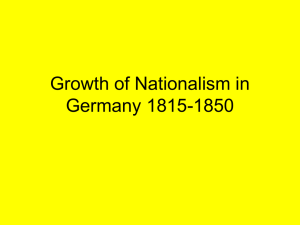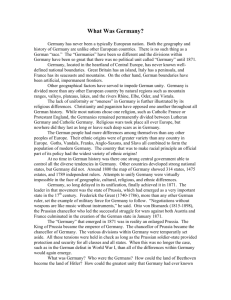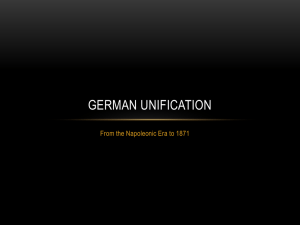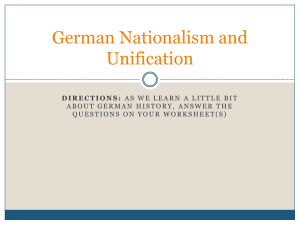Unification of Germany Study Guide - Y-MUN
advertisement
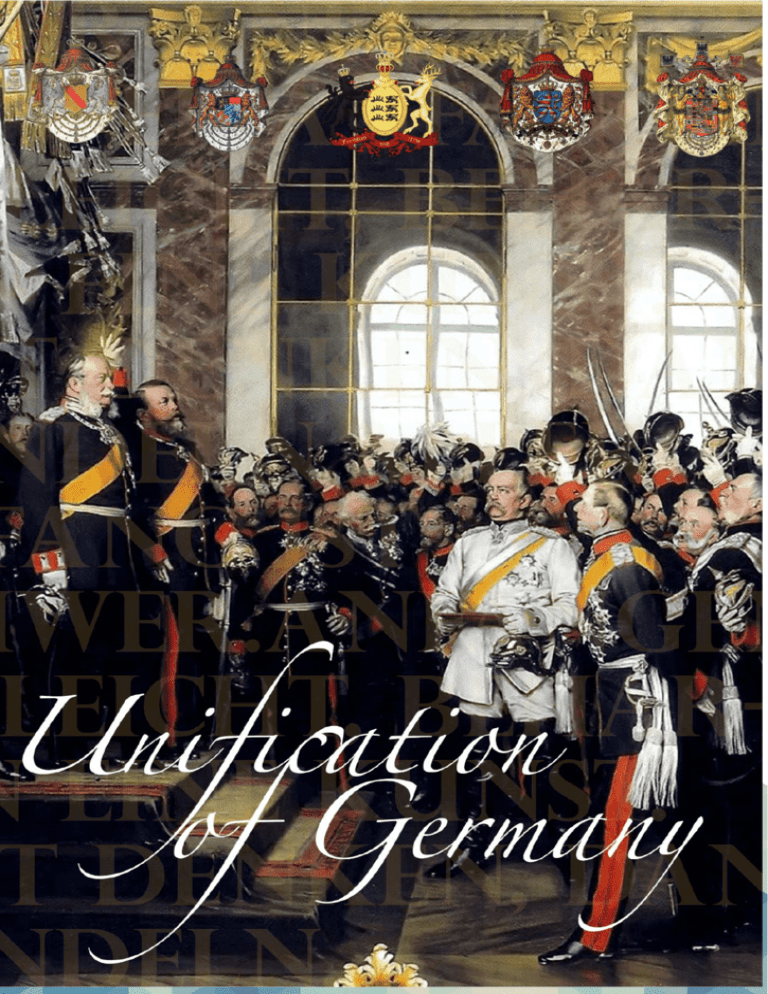
YEDITEPE MODEL UNITED NATIONS TRAINING & DEVELOPMENT CONFERENCE 2015 www.y-mun.org YEDITEPE MODEL UNITED NATIONS TRAINING & DEVELOPMENT CONFERENCE 2015 LETTER FROM SECRETARY GENERAL Prospective Participants of Yeditepe University Model United Nations 2015, As the Secretary-General of the Conference, I would like to welcome you all once again. Past few months were not easy for my academic team to provide you best quality of guides, mastered each of elements in different topics. So to speak, it was a bitter work but the results are worth it. Can you feel it? Closing in all around you, the most excided MUN event of year has been awakened. At your arrival, I could only say that to my team would be ‘Look now to your defenses, for the champions of MUN gather our gates.’ I have confidence in every participant to honor the tradition of Y-MUN and with most enthusiasm will conduct the best of debates. After all, the aspiration lies in you, and you alone. If you want to live through the top, your will must be unwavering. I would like to thank my Deputy Secretary-General, Onuralp Acar for supporting me in my darkest of times when preparing the conference. Yet, happiness and success can be found even in those dark times, if one remembers to turn on to light. I would like to send my gratitude to him for assisting me to prepare this Conference. Every committee in Y-MUN 2015 has been designed to answer different type of levels and participants. Each of their study guides have been written by the people who knows what they are doing. I would like to thank my Under-Secretary-General, Doğa Kaçar, for writing such an inspiring and detailed guide that will show the true path to expansion on knowledge regarding the topic of this committee. I hope this guide will be a constant reminder of the rewards of perseverance and skill. Çağdaş Başar Bahar Secretary-General of Yeditepe University Model United Nations 2015 www.y-mun.org YEDITEPE MODEL UNITED NATIONS TRAINING & DEVELOPMENT CONFERENCE 2015 Table of Content 1) Introduction of German History 2) French Revolution and Nationalism 3) Napoleonic Era and Its Effects on German Nationalism 4) Congress of Vienna 1814 5) Steps Toward Unification a) Zollverein b) 1848 Revolutions in “Germany” c) North German Confederation 6) Prussia’s policies and military campaigns a) Realpolitik b) Second Schleswig War 1864 c) Austro-Prussian War 1866 d) Franco-Prussian War 1871 7) Parties involved in Unification a) The Kingdom of Prussia b) The Kingdom of Bavaria c) The Kingdom of Saxony d) The Kingdom of Württemberg e) The Grand Duchy of Hesse f) The Grand Duchy of Baden g) The Free City of Hamburg h) The Free City of Bremen 8) Timeline of Events 9) Bibliography www.y-mun.org YEDITEPE MODEL UNITED NATIONS TRAINING & DEVELOPMENT CONFERENCE 2015 Introduction of German History Between 9th and 19th century, German history was associated and also integrated with Holy Roman Empire (Wolfram, 1997 p.13). Frankish-Germanic Emperor Charlemagne crowned as Emperor by the Pope in 800 (Cantor, 1993 p.212-215). The significance of the title was, none called as Emperor in Europe more than three centuries before the Charlemagne crowned. Later on, his Holy Roman Empire in 1400 Empire divided by his heirs. Otto the First (Grandson of Charlemagne) managed to other words, the powers of the Emperors extend his rule to the shores of were limited because they were very Mediterranean in the south and the Eider dependent on the allegiance of duchies, River in the North. He was the first Empire princes, and several other noblemen. Even who officially called as the “Holy Roman the Emperor was crowned as sovereign Emperor” (Chodorow, 1976 p.196). Even ruler, in de facto, he was powerless the title of Emperor sounds firm and (Johnson, 1998). The Empire never strong; Holy Roman Emperors were not achieved to be unified like other powers in the absolute monarchs, their power was Europe such as but not limited to France coming from consolidation with hundreds due to this reason until its end. However, of subunits like kingdoms, duchies, the Holy Roman Empire was named as principalities and free cities within the First German Reich due to its geographic German-speaking land (Johnson, 1998, borders, German character which created p.26). Noblemen of those subunits where linguistic, historical and cultural bound electing the Emperor but that did not make within the fragments of the Empire. Last the Holy Roman Empire to an entity. Emperor Francis the Second dissolved the Negotiations, compromises and that kind Empire after his defeat to Napoleon in of diplomatic skills of the noblemen were Battle of Austerlitz in 1806. always important. Their decisions were determining the next Emperor. In www.y-mun.org YEDITEPE MODEL UNITED NATIONS TRAINING & DEVELOPMENT CONFERENCE 2015 French Revolution and Nationalism French Revolution, refers a period political and social forces in history. of extensive social and political change in Because it has an ability to focus every France, between 1789-1799 (Fehêr, 1990, men and women within the entity called p.126). This movement can also be “nation” into a single purpose. It changed considered a middle-class revolt against the existing army, economic and social nobility and clergy. Its importance systems of the 18th century Europe regarding unification process of Germany entirely. Vast standing armies that is, it created the idea of “Nationalism”. consisted of every available man within the Nationalism is basically a group feeling nation has emerged instead of the that seeks unity and independence of mercenary system of middle ages. people who shares same geography, Economic systems also began to shape culture, language and history. In other around national interests, and that common words, Nationalism is the glue that keeps goal of the society became a fuel of society intact based on their common traits production that later on would lead to (Despina, 2005, p.222- 255). The idea of Industrial Revolution. In other words, the Nationalism has inspired a series of Revolution in France changed the existing revolutions and events in the 19th century European order and no other “nation” in including the Unification of Germany. Europe could be able to remain neglected Since the French Revolution, Nationalism to the change. has become one of the most significant www.y-mun.org YEDITEPE MODEL UNITED NATIONS TRAINING & DEVELOPMENT CONFERENCE 2015 Napoleonic Era and Its Effects on German Nationalism French Revolution was an internal control of German States and keep them in matter until General Napoleon took control his orbit, but the citizens of German States of France and declared himself as the who once under his control was no longer Emperor of France in 18th of May 1804. loyal to him (Dwyer, 2001, p. 432). He After that, he decided to export revolution was confronted by Coalition of Prussia, to other parts of Europe and started a Saxony, Austria and Wurttemberg and period of Napoleonic Wars or French Sweden in Battle of Second Leipzig or also Revolutionary Wars (Roberts, 2014). called as Battle of Nations. Napoleon had Napoleon conquered most of the Europe crushed by Coalition Forces, and that has during this period with his massive armies. ended his tyranny over Europe and started He’s sphere of influence were covering the Restoration Period, which allowed to German speaking lands too, and German grow of newly blossomed German vassals of Napoleon had influenced by the Nationalism. idea of Nationalism. Under the rule of the Battle of Leipzig French Empire (1804–1814), German nationalism rose in the reorganized German states. Under the influence of the ideas that emerged in French Revolution and also French dominance in German territories, various justifications emerged to identify "Germany" as a single state (Sheehan, 1989, p.434). French presence in German lands became disturbing for the small German States and getting rid of the French hegemony became their common purpose in time (Sheehan, 1989). After Napoleon’s failure in Invasion of Russia (1812) the German States began to regain de facto control over their territory and remove French rule over it. Napoleon gathered an invasion force in order to gain www.y-mun.org YEDITEPE MODEL UNITED NATIONS TRAINING & DEVELOPMENT CONFERENCE 2015 Congress of Vienna 1814 Congress of Vienna gathered for restoring balance in Europe after Napoleonic Wars in September 1814 (Schroeder, 1992, 683). The importance of the Congress for future of Germany is Prussia’s territorial expansion. Addition to territorial gains, Prussia recognized as one Zollverein is not the first attempt to adopt single customs and Congress of Vienna of the five main continental power along with Austria, United Kingdom, France and toll management system in German lands. Russia (Klaus, 2009, p.66). After the It was a product of long process of Congress, Austria did not remain as the diplomatic labor led by Prussia. In May “strongest” German state in the political 1818, Prussia introduced internal customs field. Recognition granted by the other union throughout its state and European states amplified the process of Hohenzollern territories in southwestern Unification. Germany, later on small German duchies, Steps Toward Unification kingdoms and principalities joined this union. In September 1824, with the Treaty a) Zollverein of Kassel, Prussia’s internal customs union Zollverein or German Customs transformed into German Central Union Union was an economic coalition between and it included both central and northern the German States in order to create a German states namely; Saxony, Hanover, common trade and customs policies in Hesse-Kassel, Saxe-Weimar, Saxe- their territories in 1 January 1834 (Price, Altenburg, Saxe-Coburg, Nassau, 1949). Austria was excluded from this Schwarzburg-Rudolstadt, Frankfurt, Saxe- union because of her own protective Meiningen, Brunswick, Schwarzburg- policies about her industry, besides that, Sondershausen, Reuss-Greiz, Reuss-Gera, Austrian Prime Minister Metternich was Bremen, Oldenburg, and Hesse-Homburg against sharing same customs management (Woodward, 1962, p.1961) Road went to system with other German states, Zollverein is important to understand the especially the Prussia (Price, 1949). fact that German States were not isolated from each other. With Zollverein, www.y-mun.org YEDITEPE MODEL UNITED NATIONS TRAINING & DEVELOPMENT CONFERENCE 2015 communication and transportation between people expressed their desire to form up a German States were considerably modern nation-state. improved and “German” identity became visible within the society. b) 1848 Revolutions in “Germany” 1848 Revolutions refers to a series of political riots within all Europe against restoration policies of conservative European states. In accord of German States, Revolutions manifested itself as Pan-Germanism, in other words, German people demanded unity for Germany Frankfurt Parliament in Session (Marx, Engels, 1977, n.p). German people believed that the unity was the only way to c) North German Confederation North German Confederation was achieve social and political progress, they also demanded political rights, constitution the first successful modern German nation- and common parliament during the state formed by twenty-two Northern Revolution (Marx, Engels, 1977). As a German States under the leadership of result of people’s will, first federal German Prussia after Prussian victory against Parliament assembled in Frankfurt which Austria in Seven Weeks’ War (Hajo, 1969, was elected in 1 May 1848. Parliament p.186). After the War, Prussia extend her made sessions between 18-31 of May and territories and annexed German States in produced the Frankfurt Constitution which the North of Mein River. That made includes civil and liberal rights and basic Prussian superiority unmatched. North characteristics of national movement German Confederation could be (Mommsen, 2000, p.96). However, it considered as a Proto-German Empire that failed because the Frederic Wilhelm the created most of its institutes and Fourth of Prussia refused to be an Emperor administrative system. due to limitations of his power and large extend of civil and political rights in the Prussia’s Policies and Military Campaigns constitution. Frankfurt Parliament was an important step towards unification process, because it was the first time German www.y-mun.org a) Realpolitik YEDITEPE MODEL UNITED NATIONS TRAINING & DEVELOPMENT CONFERENCE 2015 As a term realpolitik means that politics based on real material power (Bew, 2002, n.p) Prussian conservative statesman and Minister President Otto von Bismarck applied this philosophy in order to facilitate German Unification. He acted to preserve internal balance of German States and extend it to entire continent of Europe. He summarized his policy in his famous speech made to the Prussian Budget Committee on September 1862 namely “Blood and Iron”. “Prussia must concentrate and maintain its power for the favorable moment which has already slipped by several times. Prussia's boundaries according to the Vienna Otto von Bismarck treaties are not favorable to a healthy state life. The great questions of the time will not be resolved by speeches and majority decisions—that was the great mistake of 1848 and 1849—but by iron and blood.” (Bismarck, 1862). As can be seen in the speech, he clarified that he would not Austro-Prussian War was a military conflict between German Confederation led by Austria and Prussia and his allies due to their claims over Schleswig. It also named as Fraternal War due to power race hesitate to use material power (blood and iron) to clear the mistakes of the past. between two German States. Prussia won the war with decisive victory but the important thing is Prussia’s Minister B) Second Schleswig War Second Schleswig War was a result of conflict between Denmark and PrussiaAustria alliance for the control of HolsteinSchleswig in February 1864. In the end, Denmark had to withdraw their claims on Schleswig-Holstein Region. It was an important step to clear non-German claims President Bismarck did not demand any additional territories from Austria in order to not wound their pried and future possibilities of alliance (Aronson, 1970, p.58). This war also led to formation of North German Federation under Prussia’s leadership. over German lands. D) Franco-Prussian War 1870 C) Austro-Prussian War www.y-mun.org YEDITEPE MODEL UNITED NATIONS TRAINING & DEVELOPMENT CONFERENCE 2015 After the Queen Isabel’s them to be neutral. Bavarian Army resignation from Spanish throne, surrendered after Austrian defeat in Battle succession of the Spanish throne became a of Königgrätz (3 July 1866) and most of diplomatic problem between France and their regions were annexed by Prussia. Prussia. During the negotiations, the Later on, when the French Emperor French Minister of Foreign Affairs, had Napoleon the Third started to speak about insulted by Wilhelm of Prussia. French “compensating” French loss in 1815 and parliament demanded war for this insult threatened the Palatinate region controlled and French General Staff assured by Bavaria, Bavaria joined the North Napoleon the Third for victory. Now the German Confederation led by Prussia. future of German lands resides in your C) Kingdom of Saxony hands honorable representative! Saxony was also joined the German Parties involved in Unification Confederation led by Austria against Prussia, and made a remarkable A) Kingdom of Prussia In 1862, King Wilhelm of Prussia contribution to Austrian Army. However, they were utterly crushed by Prussian army appointed Otto von Bismarck as a in Battle of Königgrätz and a year later, Chancellor and Minister President of they joined the North German Prussia in order to destroy liberal and socialist movements and ensure Prussian supremacy over other German States. All efforts to unify German States were done under the leadership of Prussia, however Confederation. Importance of Saxony is; they were not entirely politically dependent on Prussia in their foreign affairs within the North German Confederation. They might be considered as the second best the main problem was also the Prussia candidate to throne of German “Reich”. itself, because Prussia demands nearly absolute power if they were going to unify D) Kingdom of Württemberg with other German States, otherwise King Kingdom of Württemberg was Wilhelm did not favor of unification with a liberal constitution. Napoleonic Wars, they even fight beside Napoleon during the Battle of Leipzig. B) Kingdom of Bavaria They also fought against Prussian in Kingdom of Bavaria sided with Austria during the Fraternal War against Prussia despite the Bismarck requested under French-sphere control during the Fraternal War and crushed by Prussia and forced to join North German www.y-mun.org YEDITEPE MODEL UNITED NATIONS TRAINING & DEVELOPMENT CONFERENCE 2015 Confederation. Convincing Württemberg States, Baden gave its full support to for German Unification will be a Prussia due to rising German Nationalism. challenge. G) Free City of Hamburg E) Grand Duchy of Hesse During Napoleonic Wars, Hamburg Due to its territories in East and was annexed by Emperor Napoleon. West Bank of the Rhine, Hesse is very Hamburg’s independence reinstated during important in means of logistics, Hesse was the Congress of Vienna in 1814 after located on center of important railroads Napoleon’s defeat. Throughout the that connected most of the German cities. German History, Hamburg always had a That unique geographic position made special statue. During 1848 revolutions, them a target of French Army, so they need Hamburg transformed into a democratic a strong ally to defend them. republic and made elections for Senate. Hamburg joined both German F) Grand Duchy of Baden Confederation and North German Baden was highly influenced by Confederation but they always preserved 1848 Revolutions in means of hosting their independence. Their participation to radical German Nationalists. Heat of the Unification was also depend on German Nationalism began in 1847, preservation of their status. people of Baden demanded the H) Free City of Bremen transformation of regular army into National Militia, progressive constitution Bremen had a nearly same history that would define German citizenship, with Hamburg during the Napoleonic era, national tax system and other institutions and they also share same political desires that required to be a modern nation-state with Hamburg. That makes them natural (Hugh, 1911). Between 1850-1866 Baden allies in negotiation process. Bremen must supported Austria and entered war against protect their autonomous position in a Prussia due to Schleswig Question. possible “unification”. However, Grand Duke Frederick the First withdrew from War due to the request of his cabinet before the decisive victory of Prussia. Personally, Frederik were not in favor of war too (Hugh, 2011). When Napoleon the Third threatened the German www.y-mun.org YEDITEPE MODEL UNITED NATIONS TRAINING & DEVELOPMENT CONFERENCE 2015 Timeline of Events disagreements about controlling 1815 Creation of the German Confederation under the presidency Schleswig-Holstein. Prussian army of Austria. Prussia and Austria took control over that territory and were considered the two most defeated the Austrian Empire, powerful German states.(Sturmer, However Bismarck had made sure 1997) that Austria lost no land due to not insult them.This event led the 1834 German Customs Union or formation of Northern German “Zollverein” founded and Austria Federation. It contained all German excluded from this organisation. It states north of the Main River. was an important step to removing Effectively it was under control of distance between German States in Prussia. (Sturmer, 1997) means of communication and While the southern states transportation (Williamson, 1998) e.g. Baden, Bavaria remained 1848 An attempt to set up a unified independent; The main problem Germany failed because of King of against the total unification was Prussia refused unification. France’s policiy regarding to independent German states, the 1862 As a result of a political crisis in emergence of a united Germany Prussia over the length of military under Prussia was a serious threat service, Bismarck was appointed to French supremacy in Chancellor of Prussia. He was Europe. Relations between Prussia aiming to make Prussia as dominant and France soon deteriorated over power in German lands. the vacant Spanish throne.(Williamson, 1998) 1864 An Austrian-Prussian conquer of Schleswig-Holstein led to the 1870 After a coup in Spain, Queen end of Danish rule of these provinces. Prussia gained support of German nationalists after this act Isabella was forced to resign. A formal offer of the Spanish throne was made to Leopold of Hohenzollern- Sigmaringen, a 1866 Relations between Austria and member of the Catholic branch of Prussia detoriated due to www.y-mun.org YEDITEPE MODEL UNITED NATIONS TRAINING & DEVELOPMENT CONFERENCE 2015 the Prussian royal Ambassador had been insulted by family.(Williamson, 1998) the Prussian king, the famous “Ems Bismarck released a version of the discussions to the press that gave Telegram”. The French were outraged by the telegram and two days later, declared war on Prussia. the impression that the French www.y-mun.org YEDITEPE MODEL UNITED NATIONS TRAINING & DEVELOPMENT CONFERENCE 2015 www.y-mun.org

